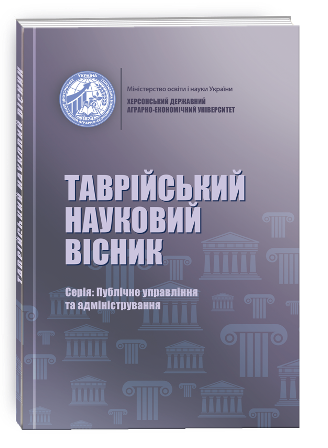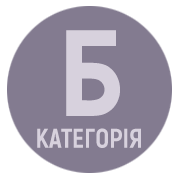THE CURRENT STATE OF THE SYSTEM OF QUALITY CONTROL OF THE TRAINING OF QUALIFIED WORKERS IN THE DUAL FORM OF EDUCATION
DOI:
https://doi.org/10.32782/tnv-pub.2024.5.3Keywords:
dual form of education, social partnership, qualified workforce, professional education, management system, training quality, educational and professional environmentAbstract
The article analyzes the current state of the system of quality control of the training of qualified workers according to the dual form of education, which is becoming more and more popular in modern professional education. The dual form involves the integration of theoretical training in educational institutions with practical experience in production, which makes quality control a key element to ensure that training meets the requirements of the modern labor market. The work examines the existing approaches to quality control, which include the assessment of the level of theoretical knowledge, practical skills, as well as the interaction of educational institutions and enterprises. Legislative and regulatory aspects of quality control of worker training are analyzed, as well as key criteria that affect the effectiveness of the evaluation system. Special attention is paid to feedback mechanisms between educational institutions and enterprises to adjust educational programs and increase their relevance to real working conditions. The article also highlights the problems and challenges faced by the quality control system in the context of constant changes in the labor market, technological development and the introduction of new innovative approaches to education. This especially applies to the adaptation of training programs to new requirements and standards that arise in various industries. Considerable attention is paid to quality control methods, such as external and internal audit, testing, certification, and other tools that help assess the level of student training. In addition, the role of various stakeholders in the control process is considered, including employers, government bodies, expert communities and the learners themselves. The article presents a comparative analysis of the Ukrainian system of quality control with international practices, in particular European models of dual education, which allows to determine promising directions of development and possible improvements of the domestic system of training workers. In conclusion, the work identifies the main trends in the development of the quality control system, among which the standardization of assessment processes, the introduction of digital technologies for monitoring and analysis of the quality of education, and the strengthening of the role of social partnership in ensuring the relevance and quality of professional training play an important role.
References
Аmosha, O., Zemlyankin, A. & 2. Moyisyeyev, G., Modern approaches to the interaction of academic science, education and industrial production. Economy and enterprise, 3: 2007, p. 4–7.
Elina Priedulena The Hamburg Model – exemplary integration of youth into vocational education [Electronic resource]. URL: http://www.vet-bsr.eu/wp-content/uploads/2015/09/Manual-HamburgModel.pdf
Організація дуальної форми навчання у закладах професійної (професійно-технічної) освіти: практ. посіб. / Т. М. Герлянд, І. А. Дрозіч, Н. В. Кулалаєва, Г. М. Романова, М. М. Шимановський; за заг. ред. Н. В. Кулалаєвої. Житомир: «Полісся», 2019. 304 с.
How the dual system – practical vocational and academic – works in Germany. Bonn, Germany: BIBB. 2012. 25 p.
Андрущенко В. П. Теоретико-методологічні засади формування вищої освіти в Україні. Педагогічна газета / Академія пед. наук України. №12(78), грудень 2000 р.
Про освіту: Закон України від 5 верес. 2017 р. № 2145-VIII. URL: http://zakon0.rada.gov.ua/laws/show/2145-19/page.
Про впровадження елементів дуальної форми навчання у професійну підготовку кваліфікованих робітників : наказ Міністерства освіти і науки України від23 червня 2017 року № 916. URL : https://ru.osvita.ua/legislation/proftech/56443.
Cередньостроковий план пріоритетних дій урялу до 2020 року: розпорядженням Кабінету Міністрів України від 3 квітня 2017 р. № 275-р. URL : http://nmcdon.org.ua/index.php/k2/news/item/2710-modernizatsiia-profesiinotekhnichnoiosvity-odyn-iz-priorytetiv-nashoi-robotytsoho-roku-liliia-hrynevych.
Про проведення дослідно-експериментальної роботи за темою «Професійна підготовка кваліфікованих робітників з використанням елементів дуальної системи навчання» на базі закладів професійно-технічної освіти: Наказ Міністерства освіти і науки України від 16.03.2015 р. № 298. URL : http://old.mon.gov.ua/files/normative/2015-04-17/3825/nmo-298-1.pdf
Методичні рекомендаціі по реалізаціі дуальноі моделі підготовки висококваліфіцікованих робітничих кадрів / уклад. О.П. Дрозд. Чернігів : ЧНТУ, 2015. 136 с.
Яковчук О.Л. Функціонування моделей дуальної форми здобуття освіти як ефективний спосіб підвищення конкурентоспроможності системи вищої освіти України. Молодий вчений. 2019. № 4 (68), квітень. С.86-90.
Пристая О. Д., Врублевська О. В. Практична підготовка фахівців для деревообробної галузі: дуальний формат. Вісник Вінницького політехнічного інституту. 2016. № 1. С.148-154.
Ажажа, М. А. Управління процесом упровадження дуальної освіти в професійну підготовку майбутніх фахівців [Електронний ресурс] / М. А. Ажажа // Публічне управління та митне адміністрування. 2019. № 1(20). С. 14-24. Режим доступу : http://customs-admin.umsf.in.ua/archive/2019/1/2.pdf
Дрозач М.І. Соціальне партнерство у професійній підготовці робітничих кадрів. Професійне навчання на виробництві : зб. наук. пр. Київ : Наук. світ, 2009. Вип. ІІІ.
Кравченко, О. Л. Дуальна освіта в Україні: від концепції до практики [Електронний ресурс] / О. Л. Кравченко // Молодий вчений. Педагогічні науки. 2021. № 2(90) лютий. С. 64-69. Режим доступу : https://molodyivchenyi.ua/index.php/journal/article/view/373
Кримчак, Л. Ю. Система дуальної освіти як умова якісної підготовки конкурентоспроможних професіоналів до ринку праці в Україні [Електронний ресурс] / Л. Ю. Кримчак // Теорія і методика професійної освіти. 2019. Т. 2. Вип. 11. С. 83-86. Режим доступу : http://www.innovpedagogy.od.ua/archives/2019/11/part_2/20.pdf
Cabinet of Ministers of Ukraine, 2018, 4. On approval of the Concept of training specialists in the dual form of education: decree. Kyiv: CMU.
Коркуна О. І. Сучасні процеси розвитку дуальної освіти: запорука стабільності кадрового потенціалу [Електронний ресурс] / О. І. Коркуна І. І. Коркуна О. Я. Цільник // Соціально-економічні проблеми сучасного періоду України. 2018. Вип. 4(132). С. 90-94. Режим доступу: 10 http://ird.gov.ua/sep/sep20184(132)/sep20184(132)_090_KorkunaO,KorkunaI,Ts ilnykO.pdf
Габенко І. М. Аспекти організації підготовки фахівців за дуальною формою здобуття освіти [Електронний ресурс] / І. М. Габенко / / Теорія і методика професійної освіти. 2019. Т. 1. Вип. 11. С. 104-107. Режим доступу : http://www.innovpedagogy.od.ua/archives/2019/11/part_1/24.pdf
Zhuravlov , Y. . (2020). The dual form of education is an embodied reality. New Collegium, 4(102), 71–75.







